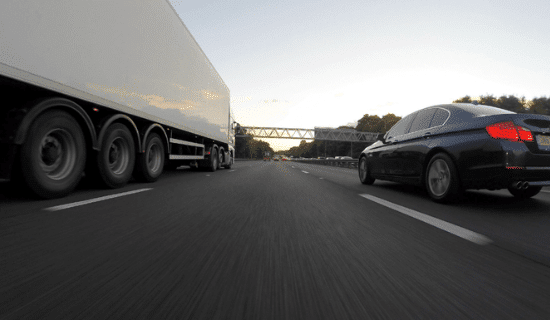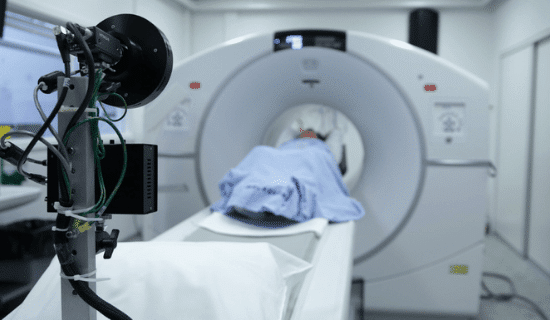An 18-Wheeler Hit My Car: What Should I Do?
Despite the countless advancements in traffic safety and vehicle safety technology in recent decades, as well as crash statistics showing a decline in fatalities per miles traveled, America’s roadways are arguably more dangerous than ever before. There are more vehicles on the roads now than in the past, and modern complications like cell phones have added to driver distraction. Drivers of commercial vehicles operate under a unique set of pressures, such as long hours on the road without breaks. Unfortunately, these pressures can lead to accidents, and enormous, heavy vehicles like 18-wheelers can cause devastating damage in a crash. If an 18-wheeler hits your car, or a loved one was involved in a crash, it’s hard to know what to do.
If the crash had devastating consequences, such as severe injuries or even death, the situation becomes even more confusing and complex. What are your rights? Are your rights any different than if the crash had involved another passenger vehicle instead of a commercial one?
If you have been affected by a crash with an 18-wheeler, it can be extremely overwhelming. Your first steps should be filing a police report, taking note of damage, and contacting your insurance company. Afterward, the best thing you can do is to hire a compassionate and experienced personal injury attorney who will work to help secure the compensation for your injuries. Even with small accidents, trucking companies will be on high alert to help ensure liability is not placed on them.
This is especially true because accidents involving large trucks usually occur when multiple factors go wrong at once.
 Why Do 18-Wheeler Truck Accidents Occur?
Why Do 18-Wheeler Truck Accidents Occur?
One major reason why semi-truck accidents occur is simply that there are so many 18-wheelers on the road—12.5 million registered in the U.S. in 2016, to be exact—together covering hundreds of billions of miles each year. Any vehicle on the road runs a certain risk of being involved in an accident, a risk level that is proportionate to the amount of time they spend on the road and the number of miles they cover. Put simply, the more time on the road and the more miles logged, the higher the chances of an accident occurring; this is true for passenger cars, commercial trucks, and every other vehicle on the road.
The problem is, when an accident happens involving an 18-wheeler truck or other commercial vehicle, the consequences can be especially devastating due to the truck’s large size and heavy weight. Commercial vehicles like 18-wheelers require much longer stopping times and distances than smaller cars and trucks. Even if a commercial vehicle driver is alert and brakes properly at the first sign of danger on the road, it takes their vehicle much longer to come to a full stop than it does a smaller, lighter-weight vehicle. This stopping time only increases when the road is wet, icy, covered in gravel, or slippery for any other reason. Add in factors like truck driver fatigue or driver distraction, and even relatively minor accidents can have tragic consequences.
Commercial truck drivers, including 18-wheeler drivers, are also subject to unique risks when it comes to roadway accidents. Federal regulations limit the number of hours that commercial drivers are allowed to spend on the road at a time and also stipulate the minimum length of breaks between driving stints. Despite this, surveys of commercial drivers show that many drivers break the rules in order to meet stringent quotas and deadlines. Many commercial truck drivers involved in accidents have also been found guilty of being under the influence of alcohol or other substances that impaired their driving safety and reaction time, which factored into the causes of the crash.
Most 18-wheeler truck accidents are the result of multiple factors combined. The most common causes of crashes involving 18-wheelers and other commercial vehicles include:
- Driver error, including distracted driving, reckless driving, and driving under the influence of drugs or alcohol. Driver error as a cause of an accident certainly applies to the commercial truck driver, but it also applies to the other driver or drivers involved in the crash.
- Poorly maintained vehicles. When commercial vehicles are not properly and regularly maintained, problems like cracked windshields and worn brake pads can become significant factors in roadway accidents.
- Equipment failure. Sometimes, accidents are caused by commercial vehicles with parts that failed not due to poor maintenance, but instead due to negligence on the part of the manufacturer of the vehicle or its components. When a commercial truck is involved in a crash caused by defective parts, the manufacturer of the parts or the mechanic who failed to diagnose or fix the defective parts may be found liable for the crash.
- Unsafe roadway conditions due to inclement weather. Weather plays a major role in roadway safety for all drivers. Rain, sleet, snow, and ice all make driving more dangerous for every vehicle on the road, and many crashes involving commercial vehicles have resulted from unsafe roadway conditions due to bad weather.
No matter the extent of the accident, it is crucial to go to the doctor after an accident to fully evaluate and document the extent of your injuries.
 Common Accident Injuries
Common Accident Injuries
Due to their larger size, commercial trucks that are involved in roadway accidents are statistically more likely to cause fatalities than smaller vehicles. Even when an accident involving an 18-wheeler or other large truck doesn’t have such ultimately tragic consequences, the effects can still be serious and extensive for the victims involved. Sometimes, accident injuries aren’t even apparent for several days after the accident. For example, crash survivors might not realize until some time has passed that they sustained neck and back injuries or another type of injury in the accident.
The most common personal injury examples include:
- Head injuries, including traumatic brain injuries, due to direct impact to the head during the crash. Even the deployment of airbags can cause head injuries in an accident.
- Broken bones, including both minor fractures and major breaks; broken arms, legs, and ribs are all common truck accident injuries.
- Neck and back injuries, including anything from minor neck pain to whiplash or even dislocated discs or spinal cord injuries.
- Internal injuries, including seat belt injuries; truck accidents can cause bleeding of the internal organs due to the powerful impact at the moment of the crash. Even though seat belts are a major safety feature in cars and trucks, they can actually cause injuries in a crash, including lacerations and internal bleeding.
Along with all of these common injuries, it is also the unfortunate truth that large truck crashes are more likely than crashes involving smaller cars or trucks to result in death for the accident victims. Even in the case of relatively minor crashes, it is extremely important to get medical attention as soon as possible after the accident. Both minor and major injuries may not be immediately apparent, and X-rays or MRIs may be required to detect neck injuries or other injuries like internal bleeding or a spinal cord injury.
 Commercial Truck Accident Statistics
Commercial Truck Accident Statistics
Commercial truck accident statistics demonstrate that accidents involving 18-wheelers and other large trucks can have devastating consequences. While many people might think crashes are more likely at night, when it’s harder to see, truck accident statistics actually show that most crashes involving 18-wheelers (both fatal and non-fatal) occur on weekdays during daylight hours. Worse still, accident statistics show that fatalities resulting from crashes involving large trucks and buses are actually on the rise in recent years.
These statistics are sobering, but there is a lot that drivers can do to improve safety for everyone on the road. Commercial drivers, as well as drivers of passenger vehicles, can work together to prevent devastating accidents. All drivers can reduce driver distraction, for example, by committing to never using cell phones while behind the wheel. Drivers can also drive at the speed limit and abide by other roadway laws. Everyone on the road can make sure to use their turn signals well in advance every time they are planning to make a turn or pull over, and to maintain their vehicles properly, including having tires and brakes inspected regularly, as well as replacing turn signal lights, brake lights, and headlights as needed.
Drivers of cars and trucks, including commercial vehicles, can also help to prevent accidents by making sure they never drive under the influence of alcohol or drugs and that they are properly rested before getting behind the wheel. In work zones, all drivers should drive extra slowly, heed all road signs and warnings, and stay alert to possible obstacles and other dangers along the road. Drivers and passengers should also use seatbelts every single time they drive or ride in a car or truck, no matter where they are sitting. In the event of a crash, seat belts can literally make the difference between life and death.
 Why Are Truck Accident Claims So Complex?
Why Are Truck Accident Claims So Complex?
Truck accident claims can be quite complex for crash victims, as well as insurance companies and attorneys, to navigate. The reason these accident claims are so complex is multifaceted. First, crashes involving large trucks are likely to cause significant injuries that result in numerous long-term complications for the victims, such as lost wages due to missed work, mounting medical bills, and reduced ability to work in the future. Second, truck accident claims are complicated by laws and regulations that apply only to commercial drivers, vehicles, and companies, and not to drivers of passenger vehicles. This is why victims of a truck accident need experienced attorneys to handle their claims to help ensure that they will receive the full compensation they deserve.
Liability is yet another factor that makes truck accident claims more difficult than some other types of crashes. Who is at fault in a car accident involving an 18-wheeler? The driver of the passenger vehicle may have caused the accident, but in many cases the commercial truck driver may also be at fault, depending on the circumstances and causes of the crash. The owner of the commercial vehicle may also be held liable, as might the trucking company, or even the manufacturer of the tires, the vehicle, or one or more of its parts. Even the truck’s shipper or cargo loader could be found liable for the crash if improper loading was a factor, such as in accidents involving trucks that were over the weight limit because they were hauling too much cargo or cargo that was too heavy.
The Truck Accident Attorneys at Slack Davis Sanger Advocate for Crash Victims
The attorneys at Slack Davis Sanger have decades of experience in successfully recouping damages for clients who have suffered devastating crashes involving 18-wheelers. We have a thorough understanding of all the laws and regulations that govern commercial vehicles and their drivers, and we bring this knowledge along with our deep compassion for our clients to every case we take on. We will fight tirelessly for your rights so that we can secure the compensation you and your family deserve.

The firm handles cases involving catastrophic personal injuries and deaths. Our work spans three decades of handling airplane and helicopter crashes, truck and car accidents, oilfield and construction accidents, and other devastating accidents. We try lawsuits throughout the country in both federal and state courts and have recovered hundreds of millions of dollars for our clients. To date, we have handled or tried cases in 47 states, read more about our attorneys and firm.
